Internalizing the GULL system at World Vision
World Vision International | Seattle, 24-26 January, 2011
An action learning model for community development
World Vision's Education & Life Skills leadership team met at the WV Global Center in Seattle, USA from 24-26 January 2011 to discuss and plan a cascade method based on the GULL system. This will be implemented in April 2011.
World Vision International (WVI) is a Christian relief, development and advocacy organization dedicated to working with children, families and communities to overcome poverty and injustice. WVI is the world‟s largest non-governmental organization and serves close to 100 million people from all religions, races, ethnicity and gender in nearly 100 countries.
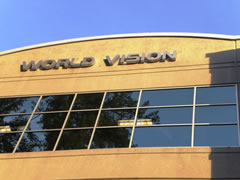 WVI is working with GULL to provide opportunity and access to lifelong learning for the many communities that it serves. The WVI-GULL initiative is founded on the practical, professional and holistic development that occurs in local communities, where we aim to encourage, recognize and certify the outcomes of action learning.
WVI is working with GULL to provide opportunity and access to lifelong learning for the many communities that it serves. The WVI-GULL initiative is founded on the practical, professional and holistic development that occurs in local communities, where we aim to encourage, recognize and certify the outcomes of action learning.
(Right) World Vision‟s Seattle offices accommodate National Office staff and some of the Global Center specialist teams.
About World Vision
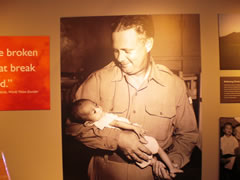 World Vision was established by the Reverend Bob Pierce after he met Tena Hoelkedoer, a teacher, while on a trip to China in 1947. She introduced him to a battered and abandoned child named White Jade. Unable to care for the child herself, she asked, "What are you going to do about her?" Bob Pierce gave the woman his last five dollars and agreed to send the same amount each month to help the woman care for the girl. Thereafter, he began building an organization dedicated to helping the world's children, and in 1950 World Vision was founded. The first child sponsorship programme began three years later in response to the needs of hundreds of thousands of orphans at the end of the Korean War.
World Vision was established by the Reverend Bob Pierce after he met Tena Hoelkedoer, a teacher, while on a trip to China in 1947. She introduced him to a battered and abandoned child named White Jade. Unable to care for the child herself, she asked, "What are you going to do about her?" Bob Pierce gave the woman his last five dollars and agreed to send the same amount each month to help the woman care for the girl. Thereafter, he began building an organization dedicated to helping the world's children, and in 1950 World Vision was founded. The first child sponsorship programme began three years later in response to the needs of hundreds of thousands of orphans at the end of the Korean War.
(Above) Reverend Bob Pierce, World Vision founder. His prayer was “Let my heart be broken by the things that break the heart of God.”
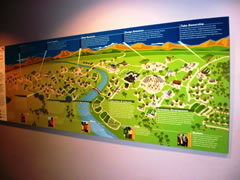 Over the next several decades, World Vision expanded its work throughout Asia, Latin America, Africa, the Middle East and Eastern Europe. Resources from child sponsorship assisted poor children with food, education, health care and vocational training. In the 1970s, World Vision embraced a broader community development model and established an emergency relief division. It attempted to address the causes of poverty by focusing on community needs such as water, sanitation, education, health, leadership training and income generation.
Over the next several decades, World Vision expanded its work throughout Asia, Latin America, Africa, the Middle East and Eastern Europe. Resources from child sponsorship assisted poor children with food, education, health care and vocational training. In the 1970s, World Vision embraced a broader community development model and established an emergency relief division. It attempted to address the causes of poverty by focusing on community needs such as water, sanitation, education, health, leadership training and income generation.
(Above) From poverty to abundance – a story board explains how WV works with communities: World Vision helps communities read the road signs and make decisions on the journey of social, physical and spiritual transformation.
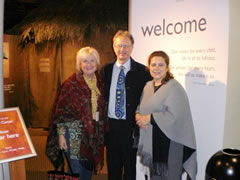 World Vision began the 21st century by strengthening its advocacy efforts, particularly on issues related to child survival and poverty alleviation. Today, some 40,000 staff members (including part time and temporary staff) implement programmes of community development, emergency relief and promotion of justice around the world.
World Vision began the 21st century by strengthening its advocacy efforts, particularly on issues related to child survival and poverty alleviation. Today, some 40,000 staff members (including part time and temporary staff) implement programmes of community development, emergency relief and promotion of justice around the world.
(Left) Marla, Richard and Pat at the entrance to the WV Visitor Center. The Mission statement (behind) reads: “Our vision for every child, life in all its fullness. Our prayer for every heart, the will to make it so.”
Cascade planning
World Vision International and GULL
World Vision is internalizing the GULL system in order to recognize the individual and collective efforts of those who are causing change and progressive transformation in communities. In 2010, a number of pilot cascades were established in different settings so as to explore ways of starting and sustaining an action learning cascade.
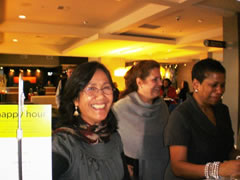 The piloting work clearly demonstrated that self- directed action learning can be operationalized on a large scale and that by engaging entire communities in the process, significant outcomes arise. These include growth in individual self- esteem and confidence and the wider implications of collective self-reliance as groups of action learners learn together, pass on their action learning expertise to others and begin to mobilize entire communities.
The piloting work clearly demonstrated that self- directed action learning can be operationalized on a large scale and that by engaging entire communities in the process, significant outcomes arise. These include growth in individual self- esteem and confidence and the wider implications of collective self-reliance as groups of action learners learn together, pass on their action learning expertise to others and begin to mobilize entire communities.
(Above) Cascade planning team members Fe, Pat and Elinor
Community-led action learning
Reflections on the cascade planning process | Community-led action learning:
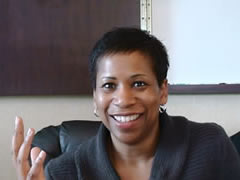 I am excited about a process and framework that empowers the most vulnerable in our communities. The poorest are unable to realize the „Genius of God‟ in them and lack of opportunity means that they are often unaware of their own potential. I believe that the action learning process will enable us to re-focus on God‟s desire to bring good news to the poor and to enable them to discover the totality of what they are able to do.
I am excited about a process and framework that empowers the most vulnerable in our communities. The poorest are unable to realize the „Genius of God‟ in them and lack of opportunity means that they are often unaware of their own potential. I believe that the action learning process will enable us to re-focus on God‟s desire to bring good news to the poor and to enable them to discover the totality of what they are able to do.
I also love the fact that the GULL cascading method inverts the pyramid and places the majority at the top so that solutions flow from the people we serve as they determine their own change process. The implications are huge – every person who is touched by this process will be able to support their own community with renewed confidence and there will be a ripple effect that we cannot even imagine at this moment in time.
Elinor Alexander
(Above) Elinor Alexander Capacity Building Advisor, Education & Life Skills, Global Center, World Vision International
Enriching the learning organization
Reflections on the cascade planning process | Enriching the learning organization:
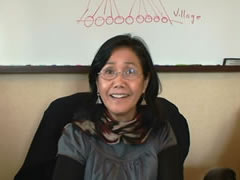 I am excited because GULL provides a framework that augments and enriches WV‟s learning organization concept and embraces our community-based work by equipping and empowering the marginalized. I have always felt that the people who are best placed to find and implement practical solutions are those who are most closely affected by the challenges that need to be addressed.
I am excited because GULL provides a framework that augments and enriches WV‟s learning organization concept and embraces our community-based work by equipping and empowering the marginalized. I have always felt that the people who are best placed to find and implement practical solutions are those who are most closely affected by the challenges that need to be addressed.
We owe it to all whom we serve to enable this to happen in a more systematic way. The cascade method offers a way of co-creating and sharing this process by releasing the creativity and potential of large numbers of people.
Fe Garcia
(Above) Fe Garcia Senior Advisor, Maternal & Child Health, Global Health Center, World Vision International
Responding to disability challenges
Reflections on the cascade planning process | Responding to disability challenges:
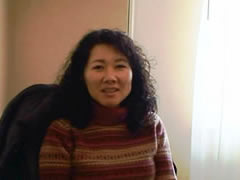 I am excited by the opportunity to participate in GULL as I know that it will enable me to have a greater impact in terms of the work we do with our partner organizations in the global disability movement. In this sphere, it is so important to work with community- based organizations and I can foresee ways in which we can share the GULL process with them.
I am excited by the opportunity to participate in GULL as I know that it will enable me to have a greater impact in terms of the work we do with our partner organizations in the global disability movement. In this sphere, it is so important to work with community- based organizations and I can foresee ways in which we can share the GULL process with them.
This is an important moment because I have always wondered how we might provide opportunities for the many people I meet in communities who are capable and yet not recognized for the skills they possess.
Hitomi Honda
(Above) Hitomi Honda Disability Advisor, Global Center, World Vision International
Aligning work with personal and professional development
Reflections on the cascade planning process | Aligning work with personal and professional development:
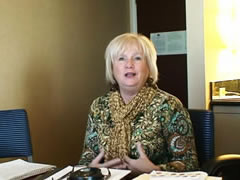 Given the time-related challenges we all have, a method that helps me to „map the madness‟ is really encouraging. I‟m also excited about the opportunity that this initiative will give me to contribute to the bigger picture. I‟m looking forward to our team effort as we seek to articulate the journeying process – so that the many with limited or no development opportunity can fully participate.
Given the time-related challenges we all have, a method that helps me to „map the madness‟ is really encouraging. I‟m also excited about the opportunity that this initiative will give me to contribute to the bigger picture. I‟m looking forward to our team effort as we seek to articulate the journeying process – so that the many with limited or no development opportunity can fully participate.
Marla Grassi
(Above) Marla Grassi Support Services Manager, Children in Ministry, Global Center, World Vision International
The potential for self-directed development
Reflections on the cascade planning process | The potential for self-directed development:
 I see GULL as a structure that will enable WV to provide self-directed development pathways for its staff and volunteers that are grounded in everyday experiences and are likely to yield fresh insights, self-confidence and greater maturity.
I see GULL as a structure that will enable WV to provide self-directed development pathways for its staff and volunteers that are grounded in everyday experiences and are likely to yield fresh insights, self-confidence and greater maturity.
I can see an immediate application – our induction process is relatively narrow and limited and by linking this with GULL we can enrich the experience and help participants to reflect more deeply on their own learning needs and the various ways in which they can contribute to the development of others. Further, we often work in a routine way in accordance with an established model and by reflecting on the actions that are taken we will be able to determine if we are doing the right things and innovate where necessary.
Osvaldo Benitez
(Above) Osvaldo Benitez Global Life Skills Work Team / HIV and AIDS Research Development Specialist, World Vision International
Equipping communities for the future
Reflections on the cascade planning process | Equipping communities for the future:
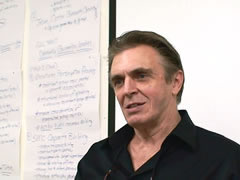 I have long been committed to the principles of GULL and our collaborative effort will help to institutionalize and operationalize our efforts to recognize and strengthen the communities that we serve. It is a timely initiative and the GULL affiliation enables us to internalize the principles and at the same time, customize the process so that it is flexible and engaging for both WV volunteers and staff.
I have long been committed to the principles of GULL and our collaborative effort will help to institutionalize and operationalize our efforts to recognize and strengthen the communities that we serve. It is a timely initiative and the GULL affiliation enables us to internalize the principles and at the same time, customize the process so that it is flexible and engaging for both WV volunteers and staff.
We already have endorsements from several WV national directors and by initiating new action learning cascades in eight African countries during April 2011, the process will build momentum across a range of initiatives in education, life skills development and healthcare.
Micael Olsson
(Above) Micael Olsson Director, Education & Life Skills, Global Center, World Vision International
GULL is a not-for-profit foundation registered in California, USA. GULL is recognized by the Government of Papua New Guinea & endorsed by other Governments, Leaders & Institutions.
- Download Article - PDF
24 January 2011
Internalizing the GULL system at World Vision International Seattle, 24-26 January, 2011